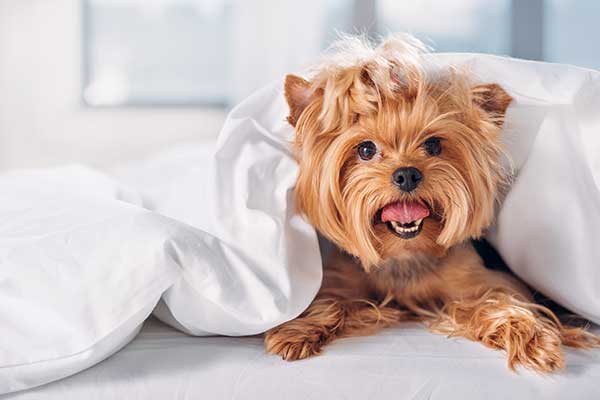You come home from work one evening to find that your dog who’s been wearing a contact lens for a temporary vision problem has all his eyes exposed. You immediately begin to scour the dog’s playing area to see if he might have accidentally dropped the lenses there. But even after extensively searching your house and backyard, the contact lenses are nowhere to be found.
Like any concerned pet parent in your situation, you’re bound to wonder if your dog will develop severe symptoms any time soon.
But are contact lenses poisonous to dogs?
The short answer is no. Contact lenses are made from material that’s generally non-toxic to dogs. Therefore, there’s no cause for immediate alarm if you discover that Fido has ingested these vision aids.
However, the fact that contact lenses are non-toxic to dogs doesn’t make them entirely safe to eat either. Ingesting these substances could still cause some nasty side effects.
Read on for everything there is to know about dogs and contact lenses.
Table of Contents
What Are Contact Lenses Made Of?
Contact lenses are typically made of plastic. That’s probably why these objects aren’t known to cause immediate issues to dogs if ingested.
Contact lenses fall into three distinct types, depending on their core features. They include soft lenses, hard lenses, and hybrid lenses.
1. Soft Lenses
Soft lenses are made from special types of hydrophilic plastics, such as hydrogel, silicone hydrogel, and hyper gel. The term ‘hydrophilic’ refers to substances that absorb water.
Due to their moisture-absorbing properties, soft contact lenses are generally soft and moist. That makes them more comfortable to wear.
2. Hard Lenses
Also known as rigid lenses, hard lenses usually feature materials like silicone, fluorine, and acrylate. These substances are non-hydrophilic and mainly work by filtering oxygen.
3. Hybrid Lenses
As the name implies, hybrid lenses are a blend of soft and hard lenses. They mainly feature a hard lens at the center and a softer lens at their sides.
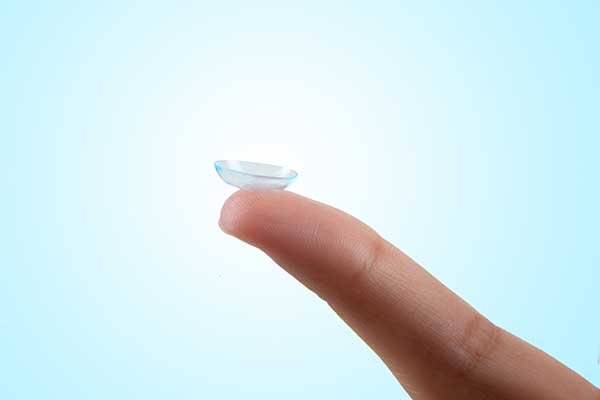
What Are The Benefits Of a Contact Lens?
A contact lens offers numerous benefits to humans and canines alike. Notable ones include;
1. Correcting Vision
Contact lenses can help improve your dog’s vision. They’re usually the first port of call for temporary eye problems. The lenses are a great option for pet parents who do not wish to subject their canine friends to eye surgeries and other invasive vision treatments.
Needless to mention, these lenses must be prescribed by a licensed veterinarian and only upon thoroughly examining your dog’s eyes. Not only should the recommended lens be able to address the dog’s vision problems. It should also be a perfect fit for his eyes.
2. Helping Eyes to Heal
Contact lenses are not only useful in correcting vision. They may also help an injured eye heal.
If your pooch has sustained an injury in or around his eyes, placing a contact lens over the cornea may improve the healing process by blocking pathogens and particulate matter from entering the eyes.
The lenses also serve as a bandage that prevents further abrasion to the damaged part. Besides, they relieve the discomfort otherwise caused by eyelid movements.
3. For Cosmetic Purposes
A lot of people wear contact lenses for cosmetic purposes. It turns out that these objects can serve the same purpose for dogs.
If intended for beauty, contact lenses are more effective for dogs with permanent eye damage caused by injuries or cataracts. The lenses act as synthetic eyes, masking the blemish on the dog’s eyes.
Are Contact Lenses Harmful To Dogs?
One of the common phone calls veterinarians receive from dog owners whose canine friends wear contact lenses is usually along the lines of, ‘help, my dog ate contact lens, will he be okay?’
As we’ve already pointed out, contact lenses are generally non-poisonous to dogs. That’s because they’re typically made from plastic material.
The assumption is that since plastic is largely indigestible, any ingested contact lenses will move through your dog’s alimentary canal and come out on the other end. And even if small bits of the lenses remain in your dog’s stomach, they’re unlikely to trigger medical emergencies. That’s in contrast to other materials like glass or metal. These materials can easily tear through your dog’s digestive tract if ingested, causing severe hemorrhage.
But does this mean you should sit pretty upon discovering that your dog has ingested contact lenses? Absolutely not.
While the plastic material in contact lenses is mostly harmless to dogs, it could still leave your pooch nursing a host of side effects. That’s especially if it remains in the dog’s stomach.
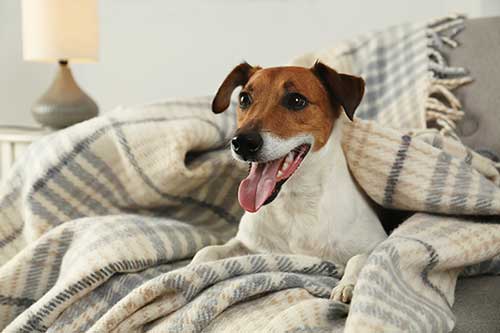
What Happens if a Dog Eats a Contact Lens?
It’s not unusual to come across a pet parent wondering, ‘my dog just ate a dried contact lens from under the bed, are there any concerns?’
There are reasonable grounds for concern if your dog has eaten contact lenses. That’s especially if the animal ingested the entire lens and not just fragments of it.
The symptoms of swallowing a contact lens mostly present as gastrointestinal distress. They include;
- Vomiting or retching
- Diarrhea
- Nausea from continued vomiting
- Inappetence
- Dehydration from incessant vomiting and diarrhea
- Signs of abdominal pain and discomfort
Ingesting contact lenses might trigger other symptoms besides gastrointestinal distress. They include;
- Coughing, especially if fragments of the plastic are still stuck in your dog’s throat
- Dilated pupils, another sign of choking
- Signs of respiratory distress, such as labored breathing
- Fever
- Pacing
- Elevated heart rate
- Lethargy
Can Dogs Digest Contact Lenses?
Swallowing the plastic material used in most contact lenses may not cause immediate health concerns. However, plastic is still indigestible. If ingested, your only hope is that your dog poops or vomits the material.
Otherwise, it will only stay in his stomach. And that’s when the symptoms of gastrointestinal distress listed above may occur.
Are The Potential Side Effects Of Ingesting Contact Lens Similar Across All Dogs?
Not really. The severity of the above-listed side effects will depend on four main factors, as discussed below;
1. Amount Consumed
Ingesting a few fragments of contact lenses may not be an immediate cause for concern. But the scenario can be awfully different if your dog happens to have eaten an entire contact lens.
2. Type of Lens Ingested
While all lenses are made from plastic, the material used can vary considerably in harness. Obviously, your dog will develop more severe symptoms from swallowing a hard lens than a soft lens.
3. Age
Anything considered potentially dangerous to dogs in general tends to affect puppies even worse. Therefore, you have all the reasons to be worried if you discover that your puppy ate a contact lens behind your back.
4. Size
Ingesting a contact lens is more likely to be a bigger problem for smaller dog breeds like the Chihuahua than larger breeds like the Great Dane.
That’s for the simple reason that smaller dogs have equally smaller guts. So, even a few plastic fragments can easily irritate their stomach walls.
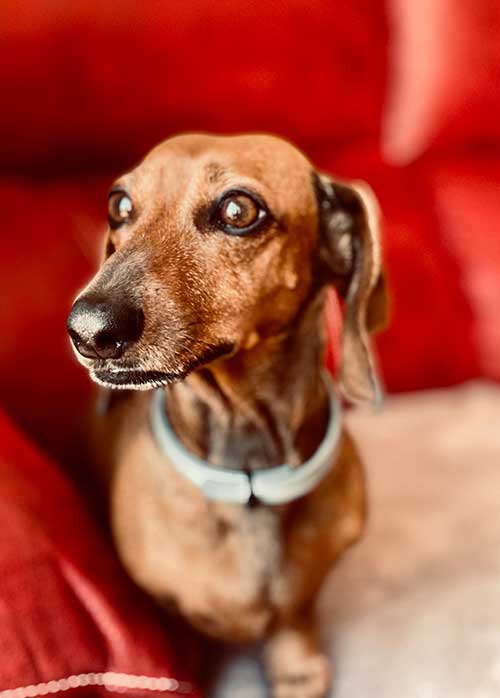
What Should You Do If Your Dog Ate A Contact Lens?
If you came home to the unfortunate discovery that your dog has eaten a contact lens, your first instinct might be to contact the vet. And during those frantic phone calls, you’re likely to pose a question like ‘my dog ate my contact lenses, what should I do?’
Well, the first thing to do if you suspect that your dog has eaten contact lenses is to determine the portions consumed. As already hinted, this will help you predict the severity of side effects.
Secondly, monitor your pooch for any of the above-listed symptoms. Pay particular attention to vomiting and diarrhea. Note that most dogs have a gut transit time of 8 to 12 hours. But this might be longer if there are foreign bodies like plastic fragments in the animal’s stomach. During this period, you should preferably get your dog a clean bowl to puke or empty his bowels. You can then examine his vomit or diarrhea for any signs of contact lens. Sounds gross, but it’s the least you can do to save your pooch from potentially more severe adverse effects of swallowing contact lenses.
If your dog doesn’t puke or poop twelve hours after ingesting contact lenses, you might try to induce vomiting and diarrhea. The best way to induce vomiting is by administering hydrogen peroxide to your pooch. As for diarrhea, you can consider giving the dog a combination of fluids and fiber-rich foods bran flakes, pumpkin, oatmeal, and whole grain bread. You could also try prescription laxatives provided that you stick to the recommended dosage.
Once you’re convinced that your dog has eliminated all the ingested contact lenses, wait for up to six hours before giving him food or water. This allows the animal’s irritated gastrointestinal tract to recover fully. Start with water to avert possible dehydration. Then, give the animal easily digestible foods like chicken broth. Normal eating can resume in twelve hours or so.
Finally, remember to contact your vet if the symptoms of ingesting a contact lens persist despite your best efforts. The vet will examine your dog and recommend the most appropriate treatment option. Providing the vet with certain crucial information might help with the diagnosis. These include the estimated amount of soft lens ingested, the type of lens consumed, and the duration that has elapsed from the time of exposure.
- Oat meal is easily digestible and gentle on the digestive system
- High protein formula, with real salmon as the first ingredient
- Fortified with guaranteed live probiotics for digestive and immune health
Last update on 2024-12-28 / Affiliate links / Images from Amazon Product Advertising API
How Can I Prevent My Dog From Eating Contact Lenses?
The best way to avert the potential side effects of contact lens in dogs is to prevent your pooch from ingesting these objects in the first place.
First and foremost, you’ll need to establish why your dog ate the contact lenses. That’s especially if this problem keeps recurring. Common reasons a dog may ingest contact lenses include;
- Underfeeding
- Understimulation
- Boredom
- Stress and anxiety
- Eating disorders like pica
The solution you adopt will depend on the underlying cause.
For instance, a satiated dog is unlikely to resort to hunger-induced eating disorders, such as consuming inedible substances like a contact lens. Therefore, always feed your dog a high-quality, balanced diet coupled with clean water.
Exercising your dog regularly might also go a long way in treating aberrant behaviors like chewing inedible products. Exercise tires a dog down. And as the saying goes, a tired dog is a happy dog.
In addition to physical exercise, you also want to ensure your pooch receives adequate mental stimulation. This might avert problematic behaviors caused by stress and boredom. The best way to stimulate your dog is by enriching his living space with interactive toys.
You could also consider training your dog to address the problem of chewing on inedible items.
Training will generally work for dogs who’re already conversant with basic commands like ‘STOP’ and ‘SIT’.
Whenever you catch Fido trying to chew on items, softly say the command ‘STOP.’ Remember to reward the dog with his favorite treat if he obeys your command.
Another effective strategy is to keep your contact lenses out of your dog’s reach. That includes not allowing the animal into your washrooms.
Lastly, schedule routine clinical checkups. Comprehensive medical examinations might help uncover conditions that may predispose your dog to compulsive eating disorders and arrest the situation before it slips out of hand.
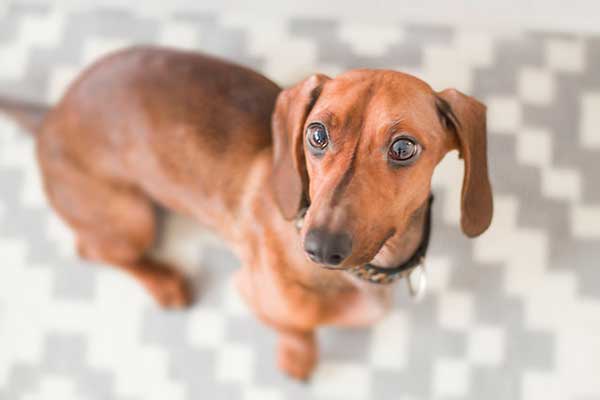
Is Contact Lens Solution Harmful to Dogs?
We’ve extensively explored the potential safety of contact lens for dogs. But these products almost always come with contact solution. So, you’re probably also wondering – is contact solution toxic to dogs?
Unfortunately, contact solution is highly toxic to dogs. These products contain ingredients known to irritate a dog’s stomach. Notable ones include benzalkonium chloride, chlorhexidine, boric acid, propylene glycol, and polyaminopropyl biguanide. Even the hydrogen peroxide commonly used to induce vomiting in dogs (and which is a common ingredient in eye solutions) can be toxic to dogs if consumed in large amounts.
Maybe you’re now wondering to yourself, ‘my dog drank eye solution, what should I do?’
Given the toxicity of contact lens solution for dogs, your best bet is to contact your vet if you suspect that Fido has consumed the product.
Final Word
Contact lenses aren’t poisonous to dogs. At least not compared to eye solutions. However, it’s still important to ensure your pooch doesn’t end up consuming these products one way or another.
In the unfortunate event that your dog eats a contact lens, remember to administer the first-aid tips we’ve listed above. Better yet, whisk the animal to the vet for a more professional checkup.
Checkout Our Favorite Dog Products
1. BEST PUPPY TOY
We Like: Snuggle Behavior Toy with Heart Beat & Heat Pack – Ideal toy for new puppies.
2. BEST DOG TRAINING PROGRAM
We Like: Doggy Dan The Online Dog Trainer – Stop any dog problem and raise the perfect puppy with The Online Dog Trainer.
3. BEST DOG PUZZLE TOY
We Like: Outward Hound Interactive Puzzle Toy – Every dog loves chasing squirrels at the park. The Outward Hound Hide-a-Squirrel Puzzle Toy gives your dog the same feeling as though he was outdoors chasing live squirrels.
4. Best Bone Broth for Dogs
We Like: (Solid Gold – Human Grade Bone Broth for Dogs) – Simmered Beef Bone Broth With Turmeric Provides A Nutrient-Dense And Flavorful Addition To Your Dog’s Meal + Rich In Natural Collagen From Beef Bones.
5. Best Multivitamin for Dogs
We Like: PetHonesty 10-For-1 Multivitamin – 10 Benefits in 1 Daily Treat – These Multivitamin Snacks combine a well-rounded blend of the most essential vitamins and supplements including glucosamine, probiotics, vitamins and omegas, for dogs’ overall daily health.

